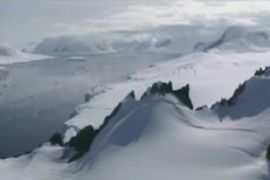Seeds to be kept in Arctic vault
Scientists store crops in Arctic vault to ensure humanity’s future food supplies.

This is the height of summer and it is cold – half the year it is light, the other half it is dark – Longyearben is a long way from anywhere and that is principally what makes it so appealing to scientists.
A vault has been carved out of the mountainside – next year the collection will begin of seeds from all food crops on the planet.
Cary Fowler, of the Dlobal Crop Diversity Trust which will be in charge of operating the project, told al Jazeera: “We can store about a million and a half seed samples in each vault.
“Inside each sealed vault will be four-ply almuminium and plastic containers [that] we think will hold up for hundreds and hundreds of years.”
Climate change
Seed banks do already exist. They are used by plant breeders to develop new varieties of crops to adapt for example, to climate change.
This seed vault will be the ultimate back up in one of the remotest and safest regions on Earth.
| Svalbard global seeds bank |
|
“I can’t think of anything where all the countries in the world are coming together and they’re doing something long-lasting, positive, conctrete and cooperating for the future of humanity.” Cary Fowler, of the Dlobal Crop Diversity Trust |
Fowler said: “Mostly seed banks are in regular buildings and they can fall prey to accidents, earthquakes, mismanagement, wars and civil strife.
“And when that happens, we actually lose diversity, which means that we have unique types of agricultural crops that literally become extinct.”
The position on the frozen mountain ensures security from rising sea levels, earthquakes, and a constant preserving temperature.
Global cooperation
All involved in the project have been moved by its importance.
The site’s project manager, Magnus Bredeli Tveitan, said: “Everyone, from myself to the workers onsite see that this is a project with a very important mission. A unique project for them, emotionally as well.”
Folwer echoed Tveitan’s thoughts: “I think of all the craziness in the world and I can’t think of anything where all the countries in the world are coming together and they’re doing something long-lasting, positive, concrete and co-operating for the future of humanity.”
In recent times wars in Iraq, Afghanistan and Rwanda have wiped out dozens of unique crops.
Now here at the very ends of the Earth, is a back-stop to such destruction of bio-diversity.